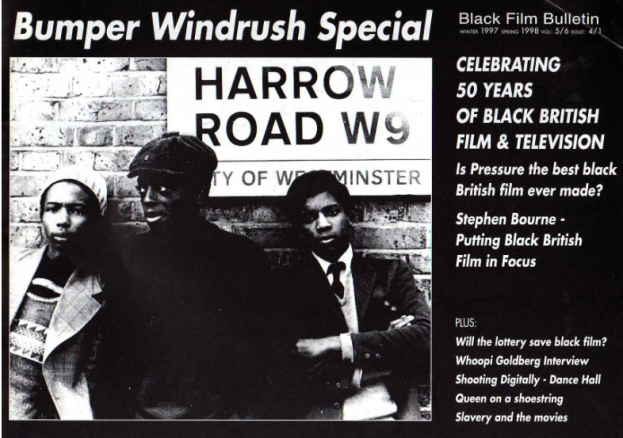
Every Movement has its golden age; its
Zeitgeist moment, when the prevailing spirit, defining ideas and aspirations of a generation either clash or converge, to shape new art forms and identities. It is in this cultural context that the ‘Black Film Bulletin’ emerged in early 90s Britain, beckoning a promising era of New Black cinema.
Black Film Bulletin magazine crystallized at the British Film Institute in 1993; the brainchild of founding editors June Givanni and Gaylene Gould. The emergence of Black Film Bulletin at the BFI in the year following the creation of an on-site African-Caribbean Film Unit established by June Givanni, was as much testament to the early 90s signalling a zenith moment in African Diasporic cinematic culture as a whole,
as it was distinctly rooted in a British-based Black Arts Movement renaissance that had taken shape in the 1980s.
The 1980s and early 90s marked an unprecedented moment for Black filmmakers in Britain, due in no small part to a mandate from the UK film industry and government. Developmental support at union level was pledged to the film workshop movement in general, and with the help of the
GLC came the establishment of Black-British film workshop collectives, through which acclaimed filmmakers including John Akomfrah (‘The Stuart Hall Project’), Isaac Julien (‘Young Soul Rebels’) and Menelik Shabazz (‘Burning An Illusion’) would emerge.
Black Audio Film Collective, Sankofa film workshop, Retake and Ceddo Film Workshop were among the principle collectives to break through during this era.
Intrinsic to the ethos of Black-British film workshop collectivism was an awareness of
cultural legacy, autonomously evolved through cross-collaborative practice. Much of the initial output of Black British film workshops was decisively invested in the
exploration of ‘Black experience’ as political and as interconnected to the stories of other migrant communities both within and beyond Britain.
The existence of Black Film Bulletin at the BFI within this particular moment of Diaspora film culture was significant. Its strategic positioning afforded it a prime platform
through which to project the depth of cross-collaborative ideas and intersectional dialogues around the politics of Black imagery transpiring throughout the African Diaspora. Black Film Bulletin created a space through which to engage the works of diverse and pioneering Black filmmakers, writers and intellectuals. In its pages were the voices of Oscar Micheaux, Ousmane Sembene, Djibril Diop Mambéty, Haile Gerima, Horace Ové, Euzhan Palcy, Raoul Peck, Julie
Dash, Charles Burnett, Spike Lee, Arthur Jafa, John Singleton, Kasi
Lemmons, John Akomfrah, Ngozi Onwurah, Isaac Julien, Gurinder Chadha, Pratibha Parmar, Paul Gilroy, Stuart Hall,
Toni Cade Bambara, bell hooks and many more.
Black Film Bulletin was in its timely essence a conversation founded upon both memory and Movement: dispersed yet
interconnected voices of an expansive African Diaspora, historically informed by the experience of colonialism and by
the magnitude of post-colonial liberation struggles, from Pan-Africanism to Négritude to Black Power and beyond.
It is a tragic twist in the tale that marked the demise of both the African-Caribbean Film Unit and the BFI-situated Black Film Bulletin in the summer of 1996. Though the Black Film Bulletin magazine moved to a different institution, helmed by another impassioned editorial team, the magazine ultimately ceased publication altogether at the dawn of the new millennium. Rare collectibles from the Black Film Bulletin era are housed today in the June Givanni Pan African Cinema Archive, established in 2014. [junegivannifilmarchive.com]
It’s been three long and protracted decades since those pledges made by the UK film industry to support the work of Black-British film workshop collectives – the dissipation of which arguably contributed the relative dearth of British-made Black television and film programming post-2000, and the continuing so-called ‘exodus’ of Black British acting talent to other shores.
Is now the ideal moment to seize upon the seemingly revitalised interest in the Black presence on screen? Does the recent buzz around Black actors and filmmakers making award-winning strides in Hollywood, together with the lingering ‘diversity’ debate here in Britain dictate a revival? If ever there was a time to revisit the mission of Black Film Bulletin; to diffuse the cultural wisdom of old through the contextual lens of today’s makers of the moving image, that time would appear to be right now.
_________________
Jan Asante is the founder of creative consultancy brand Culture Kinetica: T HINK CINEMATIC . As a curator, Jan has produced #BCAFilmFest in partnership with Black Cultural Archives since 2014, and served as a consultant on the 2016 BBC series ‘Black Is The New Black’. As a film writer, Jan has contributed to BFI/British Film Institute’s ‘Black Star’ Compendium and has been featured in Sight & Sound Magazine, Indiewire.com, Shadow & Act and June Givanni Pan African Cinema Archive.
[@JanaSante | @CultureKinetica | facebook.com/CultureKinetica]
